The Ghana Health Service (GHS) has announced a surge in Mpox cases, with 21 new infections raising the national count to 218. This escalating situation has sparked growing concerns about the virus’s transmission dynamics and potential impact on public health. Mpox, previously known as monkeypox, poses a significant threat due to its relatively easy transmission through direct skin-to-skin contact. The GHS has issued a stark warning, emphasizing the urgent need for public awareness, individual responsibility, and proactive measures to curb the outbreak’s trajectory. The current increase in cases underscores the importance of early detection, rapid medical intervention, and prompt reporting to effectively contain the virus and mitigate its spread. Authorities are working diligently to reinforce surveillance efforts, strengthen public education campaigns, and ensure access to necessary medical resources in affected areas.
The primary mode of Mpox transmission is direct physical contact with an infected person, typically involving skin-to-skin interaction. This can occur during intimate encounters, close personal contact, or through contact with contaminated materials like clothing, bedding, or surfaces. While less common, respiratory droplets can also transmit the virus, although this generally requires prolonged close contact. The GHS has emphasized the importance of avoiding close physical contact with individuals exhibiting Mpox symptoms and practicing meticulous hand hygiene to prevent viral spread. Public awareness campaigns are crucial in disseminating this information and empowering individuals to take proactive steps to protect themselves and their communities.
Mpox typically manifests with a constellation of symptoms that can range from mild to severe. The most common initial symptoms include fever, often accompanied by chills and body aches. A distinctive rash, which can resemble pimples or blisters, typically develops within one to five days after the onset of fever. This rash often begins on the face and then spreads to other parts of the body, including the palms of the hands and soles of the feet. Swollen lymph nodes, muscle aches, and fatigue are also frequently reported. While Mpox is generally self-limiting and resolves within a few weeks, complications can arise in some cases, particularly in individuals with weakened immune systems.
The GHS has stressed the urgency of seeking immediate medical attention upon the appearance of any Mpox-related symptoms. Early diagnosis is essential not only for initiating appropriate treatment but also for implementing measures to prevent further transmission. Prompt reporting of suspected cases allows health authorities to quickly trace contacts, isolate infected individuals, and implement targeted interventions to control the outbreak. Delays in diagnosis can increase the risk of complications and facilitate wider community spread, highlighting the importance of proactive engagement with the healthcare system. The GHS has assured the public that medical support and resources will be provided in affected areas to facilitate timely diagnosis and treatment.
The collaborative efforts of the GHS, along with local and international health partners, are crucial in addressing this evolving public health challenge. The GHS is actively monitoring the situation, strengthening surveillance systems, and coordinating with international organizations to implement best practices in Mpox management. Public education campaigns are being intensified to disseminate accurate information about the virus, its transmission routes, and preventive measures. The GHS has reiterated its commitment to safeguarding public health and is actively working to ensure a coordinated and effective response to the ongoing outbreak.
The collective responsibility of the public plays a pivotal role in controlling the spread of Mpox. Individuals are urged to remain vigilant, adhere to preventive guidelines, and report any suspected cases promptly. Avoiding close contact with individuals displaying symptoms, practicing proper hand hygiene, and seeking timely medical attention are crucial actions. Community engagement and cooperation are essential in supporting public health efforts and curtailing the outbreak’s progression. The GHS has appealed to the public to work together to protect community health and prevent further transmission of the virus. This collective action, combined with the proactive measures implemented by health authorities, is crucial in mitigating the impact of the Mpox outbreak in Ghana.














